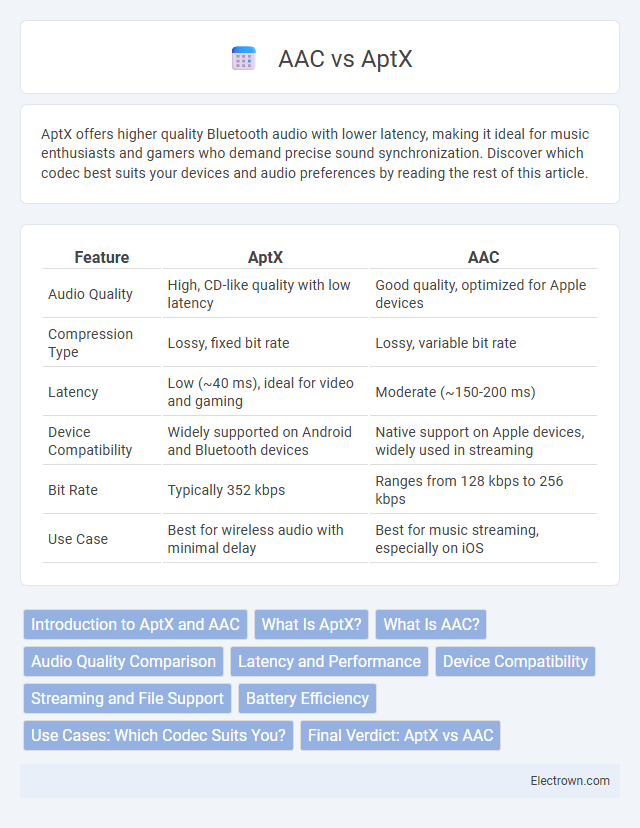AptX offers higher quality Bluetooth audio with lower latency, making it ideal for music enthusiasts and gamers who demand precise sound synchronization. Discover which codec best suits your devices and audio preferences by reading the rest of this article.
Table of Comparison
| Feature | AptX | AAC |
|---|---|---|
| Audio Quality | High, CD-like quality with low latency | Good quality, optimized for Apple devices |
| Compression Type | Lossy, fixed bit rate | Lossy, variable bit rate |
| Latency | Low (~40 ms), ideal for video and gaming | Moderate (~150-200 ms) |
| Device Compatibility | Widely supported on Android and Bluetooth devices | Native support on Apple devices, widely used in streaming |
| Bit Rate | Typically 352 kbps | Ranges from 128 kbps to 256 kbps |
| Use Case | Best for wireless audio with minimal delay | Best for music streaming, especially on iOS |
Introduction to AptX and AAC
AptX and AAC are popular audio codecs used for wireless audio streaming, each optimized for different device ecosystems and audio quality preferences. AptX, developed by Qualcomm, is designed to provide high-fidelity sound with reduced latency, commonly found in Bluetooth headphones and Android devices. AAC, or Advanced Audio Codec, is widely adopted by Apple products and streaming platforms, offering efficient compression and better audio performance at lower bitrates.
What Is AptX?
AptX is an audio codec developed by Qualcomm designed to deliver high-quality wireless sound by compressing audio with minimal latency and loss of quality, commonly used in Bluetooth headphones and speakers. It supports 16-bit/44.1 kHz CD-like audio and offers better sound clarity and stability compared to standard SBC codecs. AptX HD and AptX Adaptive versions provide enhanced bitrates and improved performance for audiophiles seeking superior Bluetooth audio experiences.
What Is AAC?
AAC (Advanced Audio Coding) is a lossy digital audio compression format designed to improve sound quality at similar bit rates compared to MP3. Widely supported across Apple devices and streaming platforms, AAC offers efficient encoding to deliver clear audio with reduced file sizes. Its compatibility with Bluetooth audio devices makes it a popular choice for wireless headphones and speakers, enhancing user listening experiences.
Audio Quality Comparison
AptX audio codec delivers higher fidelity sound with lower latency by using 16-bit, 44.1kHz CD-quality audio compression, preserving more details in music compared to AAC's lossy compression that typically supports up to 256 kbps bitrate. AAC, widely supported across Apple devices and streaming platforms, offers efficient compression with decent sound quality but may introduce artifacts in complex audio passages. For audiophiles seeking clearer mids and highs in Bluetooth transmissions, AptX generally provides superior audio quality, especially when paired with compatible hardware.
Latency and Performance
aptX offers lower latency compared to AAC, making it ideal for real-time audio applications like gaming and video streaming where audio-visual synchronization is crucial. AAC has higher latency, which may cause noticeable audio lag but provides broader device compatibility and better audio quality at lower bitrates. Performance-wise, aptX delivers more consistent audio quality over Bluetooth by utilizing efficient compression techniques, whereas AAC excels in environments where hardware support is optimized, such as Apple devices.
Device Compatibility
AptX offers wide compatibility with many Android devices, including smartphones, tablets, and wireless headphones, ensuring high-quality audio streaming over Bluetooth. AAC is natively supported by Apple devices such as iPhones, iPads, and Macs, providing seamless integration and efficient power usage. Your choice between AptX and AAC should consider the ecosystems of your devices to maximize audio performance and compatibility.
Streaming and File Support
AptX delivers superior streaming quality with low latency, making it ideal for high-fidelity audio over Bluetooth, while AAC offers broad compatibility across Apple devices and many streaming platforms. Your choice of codec impacts the playback experience, especially when streaming from services supporting AAC, ensuring seamless integration and consistent audio quality. File support varies as AAC is commonly used for compressed audio files like MP4 and M4A, whereas AptX primarily enhances Bluetooth transmission rather than file encoding.
Battery Efficiency
AAC generally provides better battery efficiency than AptX due to its lower complexity in audio encoding and decoding processes, resulting in reduced power consumption on compatible devices. AptX, while delivering higher audio quality at similar bit rates, requires more processing power, which can lead to faster battery drain on smartphones and wireless headphones. Devices optimized for AAC codec, particularly Apple products, tend to experience longer playback times compared to those relying on AptX for Bluetooth audio streaming.
Use Cases: Which Codec Suits You?
AptX delivers superior sound quality and low latency, ideal for Android users and wireless headphones in gaming or video streaming scenarios. AAC is optimized for Apple devices, providing efficient compression and better compatibility with iOS and macOS for music and video consumption. Choosing between AptX and AAC depends on your device ecosystem and whether audio fidelity or seamless integration takes priority.
Final Verdict: AptX vs AAC
AptX delivers superior audio quality with lower latency, making it ideal for Android users and devices supporting Bluetooth streaming. AAC, favored by Apple devices, offers efficient compression and better compatibility within the iOS ecosystem but may experience higher latency compared to AptX. Choosing between AptX and AAC depends on device compatibility and user priorities such as audio fidelity or seamless integration.
AptX vs AAC Infographic

 electrown.com
electrown.com